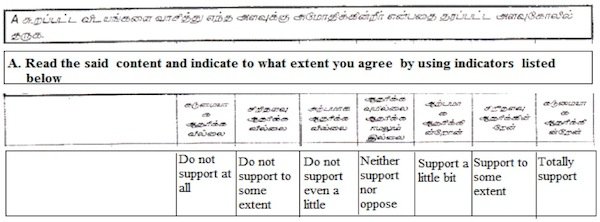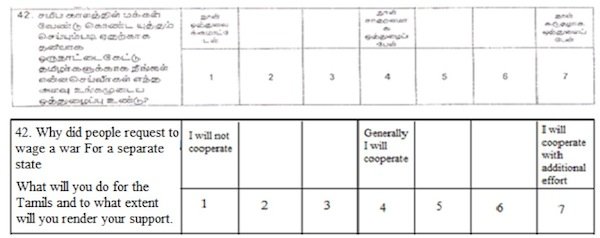Introduction
As mentioned by TSA,[1]the government has prepared a lengthy, heading-less, and inappropriate questionnaire[2] (in poorly written and, at times, incoherent Tamil) which has been used to obtain information about ex-combatants before they leave Protective Accommodation and Rehabilitation Centres (PARCs).
The document appears to place no genuine emphasis on emotional wellness at all; one need not be a mental health professional to see that. No information was given as to why this questionnaire was administered. The only visible indication on the document is RQ-SL (Adult).
It appears that this questionnaire was intended to capture the pulse of ex-combatants prior to their release.
Some Specifics[3]
The introductory portion of Part A tells respondents to do the following:
There are forty-two questions in Part A. None of which are “Yes” or “No” questions. Rather, respondents are expected to give scaled responses; for each question, one is able to pick from the seven possible choices listed above.
After carefully examining this questionnaire, it is clear that an ordinary person would need to spend an inordinate amount of time just trying to grasp the meaning of these convoluted questions. Unfortunately, the document appears to have been designed to put ex-combatants in complex, difficult and mentally excruciating situation. An ex-combatant could not help but feel a deep sense of trepidation as s/he engages with this document. After all, respondents were still being held by State authorities when they gave their answers.
An Ex-Combatant’s Thoughts
An ex-combatant who filled out this questionnaire said the following about the process: “I do not understand why we were asked to fill out this form. For many questions, I could not even understand the question; I couldn’t make heads or tails of this thing. As I was answering the questions, there were many times when I was unable to read closely; I was so nervous. At the time, I was seated in front of an intelligence officer and felt like I was at a psychiatric unit. By reading through this questionnaire, anybody will realize how little importance the government gives to the rehabilitation of people like us. They do not care if we are properly reintegrated into our respective communities or not.”
Statement eight in Part A is as follows: “Killing of innocent people by armed groups cannot be defended for any reason whatever.”
For starters, the term “Armed Groups” is not even defined; given the context, this is extremely problematic. There is no easy or “correct” way to answer this question. If a respondent were to show support for this statement, State authorities might think s/he disagrees with how the war’s final phases were fought and the massive civilian casualties which occurred during in 2009. The role of State-backed paramilitary groups further complicates matters, not least because some are still operational. This begs the following questions: Would State authorities believe that an ex-combatant’s response applies equally to all armed groups (i.e. military, paramilitary and the LTTE)? How would State security personnel interpret an answer to this question? What would be the response from members of the Sri Lanka Army if they were asked this question?
On the other hand, if an ex-combatant were to show his/her disapproval of such a statement, State authorities may accuse the ex-combatant of defending the LTTE and their release might become indefinite. Either way, the ex-combatant is left in a difficult position.
For the eighteenth statement, ex-combatants are asked to assess the following: “Those who not follow Tamil Tigers will be punished.”
It is unclear whether the time period alludes to a moment before the war, during the war, the present, or the future. This appears to be a deliberately confusing statement. It seems that the question was designed to gauge an ex-combatant’s current support for the LTTE.
If an ex-combatant does not support this statement, military personnel may infer that this person willingly joined the LTTE. Again, the fact that it is unclear whether this statement reflects the past or the present invariably generates an enormous amount of confusion.
In addition, it appears that many statements in the questionnaire are meant to discern how ex-combatants perceive questions surrounding crimes against humanity, violations of international human rights and violations of international humanitarian law. The questionnaire may also have an ulterior motive: to justify State-sponsored terrorism.
The twenty-second statement in Part A says: “Only killing out of revenge is murder under the law.”
The twenty-fifth statement for assessment is as follows: “The Sinhala People crush and disregard the Human Rights of the other race.” Respondents would need to tread carefully here as well. Were respondents to show even a moderate amount of agreement with this statement, they would surely face extended detention, heightened intimidation or worse.
For number forty-one in Part A, ex-combatants are asked to assess the following statement: “Sinhala people are generally pleasant talkers.” Again, what would be the value of an ex-combatant voicing any disagreement with a statement of this nature? Would State security personnel (almost all of whom are Sinhala) be happy if an ex-combatant were to disagree with such an assertion? Are State authorities expecting (or even hoping) that ex-combatants show racial hatred towards Sinhala people? It is likely that these ex-combatants’ most extensive interactions with the Sinhala community has occurred in the PARCs. This type of statement contributes to profound suspicions that many people harbor about the government’s approach towards national reconciliation.
Repeatedly during interviews, ex–combatants told TSA that they had a lot of trouble responding to this questionnaire and that, on several occasions, they did not understand what was going on.
The twenty-seventh statement in Part A notes: “Countries have taken the task of destroying the world.” Even to a highly educated reader, this is an inscrutable statement. Is this a reference to all countries or only certain countries? What could the “correct” answer possibly be?
The thirty-ninth statement in Part A asks ex-combatants to assess the following sentence: “There are various ways to put forward matters to the Tamil people without wounding them.”
On numerous occasions, ex-combatants who were released have told TSA that they worry that the government still thinks they are trying to create a separate state in the country’s North and East. Accordingly, it comes as no surprise that the last section of Part A includes the following: “Why did people request to wage a war For a separate state.” This is followed by “What will you do for the Tamils and to what extent will you render your support.”
Conclusion
This questionnaire is detrimental to the reconciliation process. The fact that the questionnaire is an official government document makes matters even worse. When it comes to reconciliation, the government’s rhetoric continues to fall short of reality. Nevertheless, it is still disappointing to see that such nefarious intentions appear to have official State approval
[Editors note: Read Part 1 of this series Post-war Sri Lanka’s Thought Police: The Rehabilitation of Ex-Combatants and the Denigration of Tamil Identity here]
GV









